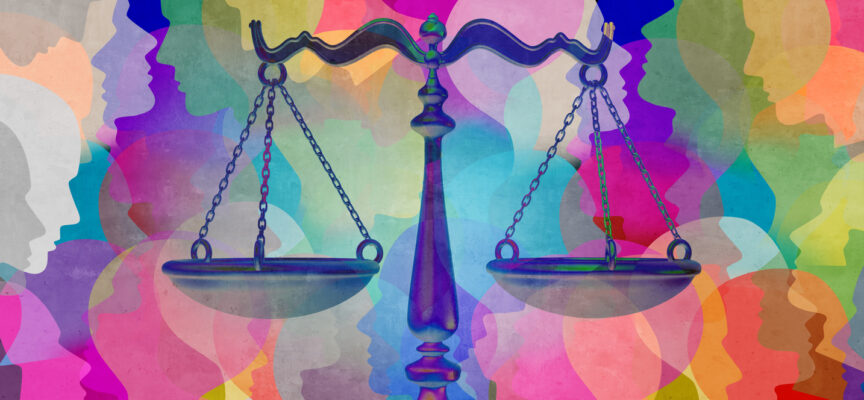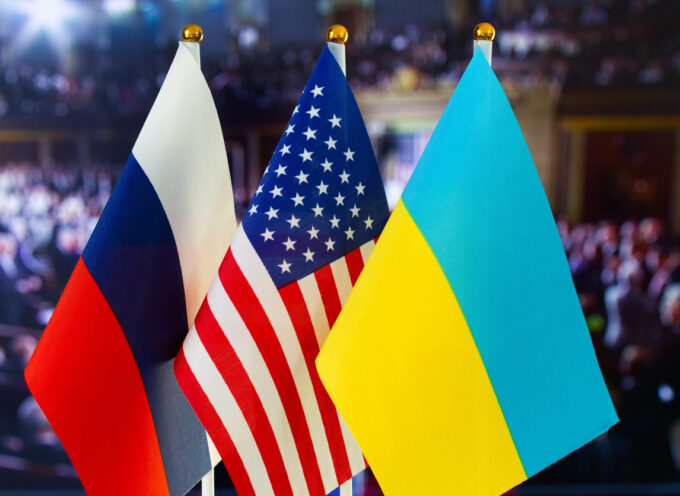Justice is, and always has been, “social.” That’s the nature of it. Justice is meted out in relation to people, and thus is social. To speak of “social justice,” therefore, is redundant. It’s similar to speaking of “transportation automobiles,” “writing pens,” or “true truth.” Thus, when this article uses the term “Social Justice,” it is referring to a very recent, highly specific, postmodern view of justice.
What is Social Justice Theory?
Social Justice Theory (SJ) can be viewed as the culminating Theory of postmodern politics and activism. It draws upon, and interacts with, Postcolonial Theory, Queer Theory, Critical Race Theory, Disabilities Theory, and Fat Theory in asserting that society is structured by powerful but invisible identity-based systems that privilege certain social groups above others. They believe that knowledge is socially constructed to serve the power interests of certain dominant social groups.
Thus, proponents of SJ assert that society is pervasively infected by colonialism, patriarchy, white supremacy, imperialism, heteronormativity, cisnormativity, ableism, and fatphobia. They believe that whites are racist, men are sexist, skinny people are fatphobic. (Et, as they say, cetera.) In response to these asserted evils, they wish to disrupt traditional ways of speaking, blur traditional boundaries, and reject traditional categories as a way of overturning social hierarchies. SJ espouses a radical cultural relativism.
What is Social Justice Theory’s view of reason and evidence?
Social Justice scholarship focuses on group identity. For that reason, it rejects any way of thinking that prioritizes reason and evidence in the pursuit of truth. Instead of reason and evidence, SJ asserts that society should prioritize the emotions and lived experiences of minority social groups. Only then, it argues, will we achieve “epistemic justice.”
Scholars in nearly any academic discipline can be Social Justice scholars, so long as they demote science and reason in favor of “other ways of knowing.” Many of them believe that science and reason are used by powerful social groups merely to justify their own preferences. Other Social Justice scholars are more moderate, arguing that science and reason are acceptable but must be complemented by other ways of knowing. Regardless, Social Justice scholars typically don’t emphasize the fact that that a social group’s emotions and lived experiences can distort experiential knowledge and therefore are unreliable guides.
What is standpoint theory and how does it relate to Social Justice Theory?
Social Justice Theory appropriates “standpoint theory,” which assumes that people of a given “marginalized” identity are pervasively oppressed, will have the same experiences of oppression, and will interpret those oppressive experiences in the same way. It also assumes that one’s position within power dynamics determines what they can and cannot know. Thus, it focuses almost exclusively on group identity rather than on the individual or the universal.
Appropriating standpoint theory, Social Justice Theory argues that members of dominant groups live within a world that is organized for them, while oppressed members live within a world organized against them. Social Justice Theorist Jose Median, for example, argues that members of privileged groups are “epistemically spoiled” in that they have great difficulty recognizing their own biases and correcting their mistakes.
Now that Social Justice scholarship—in conjunction with standpoint theory—reigns supreme in the university and in society, it’s quite difficult to speak to justice issues from a different perspective. This ideological closedness issues forth in an authoritarian impulse. It refuses to submit its ideas to rigorous scrutiny. It accuses opponents of immorality and insincerity.
How has Social Justice Theory affected American universities and corporations?
Theory has overflowed out of the academy and into every sphere of culture. Yet, it remains especially dominant universities. Social justice scholarship is affecting students in significant ways. The social justice “industry” is now worth billions of dollars. Offices of diversity, equity, and inclusion now dominate campuses and wield significant power. One problem with this is that SJ scholarship and ethics subvert rigorous and reliable scholarship, especially in disciplines like history, science, literature, and philosophy.
In the past, universities have been the least biased and best centers of knowledge production. Yet now, the SJ industry is causing ideas to be censored. This sort of cultural indoctrination becomes woven into the minds of students who will graduate and one day lead our nation’s cultural institutions.
Some of the most notorious social justice advocates are found in activist groups like Antifa but other, lesser-known, examples abound. Many corporations have capitulated to SJ pressure. Facebook, Google, Patreon, Twitter, YouTube and other web companies have banned certain users who violate SJ ideas. Celebrities are punished and flash mobbed for politically incorrect things they may have said 10 or 20 years ago. The list goes on.
How has Social Justice Theory infantilized Americans?
For readers interested in how Social Justice Theory has negatively affected American society, see Lukianoff and Haidt’s The Coddling of the American Mind and Campbell and Manning’s The Rise of Victimhood Culture.
Lukianoff and Haidt show how today’s American young people are significantly less resilient and less capable of coping with difficult ideas and hurt feelings. Whereas religion, therapy, and traditional American culture teach young people to let go of resentments and adopt a positive mindset, Social Justice Theory inflames suspicion, resentment, and a culture of victimhood.
Campbell and Manning explore the rise of victimhood culture at the expense of honor culture and dignity culture. In an honor culture, people refuse to be dominated by others. In dignity culture, people are encouraged to ignore most slights and resolve conflicts by legal means. Victimhood culture is similar to honor culture in fighting against domination but does so from a place of weakness rather than strength; it demands emotional safety.
How should Americans think about Social Justice Theory?
Like Marxism and other ideologies, Social Justice Theory may look good “on paper,” but it is divisive and harmful in reality. SJ is authoritarian, tolerating no dissent and brooking no compromise. It expects other people to conform to the SJ agenda or be “canceled.” It has created a metanarrative of its own, a grand sweeping explanation of society and culture, and engages in frenzied attempts to find and inflate even the smallest transgressions of its rules.
As a comprehensive ideology, SJ functions like a religion. Yet, unlike Christianity, it is hostile toward reason and sometimes toward medical science. Its claims are not empirically falsifiable and it does not tolerate disagreement.
In the political realm, it turns E Pluribus Unum on its head, actively seeking to splinter the one into the competing “many.” It is coercive in nature, undermining procedural justice in an attempt to achieve equality of outcomes.
Subscribe
Never miss a post! Have all new posts delivered straight to your inbox.








Thank you for the post. This topic is something that most Americans do not understand and have no idea the changes it is making to our Country. We have to find a way to let middle America know about it. Thank you for doing your part. Please keep up your good work.
Thank you, Robert!